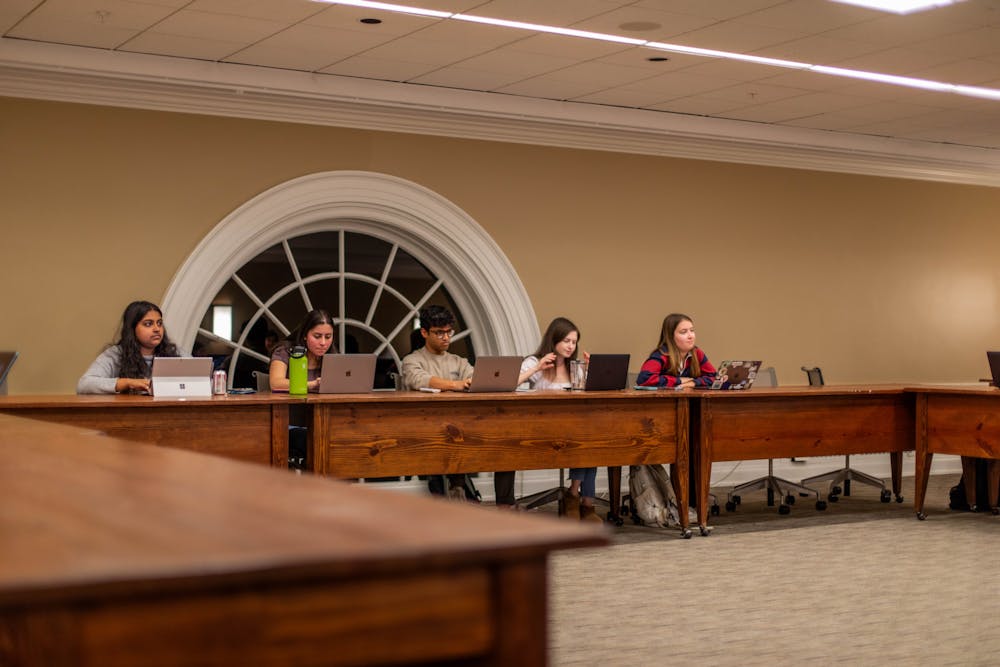A new bylaw from the Honor Committee will suspend case proceedings during non-school days, unless students request the case continue over breaks and resources are available. During their Sunday meeting, the Committee also considered conflation of different roles within the Panel for Sanction. The meeting met quorum with 21 out of 29 members present, meaning the Committee could vote on topics regarding the constitution or bylaws.
The bylaw change, as it was initially proposed by Nishita Ghanate, vice chair for investigations and fourth-year College student, will halt all case proceedings over non-school days such as winter or summer breaks. Since the last meeting, the bylaw change was adjusted to allow for cases to continue over the summer if the case can be reasonably conducted and if the continuance of the case is requested by the respective parties.
Prior to voting on the bylaw change, the Committee gauged Honor support officers to see if they would be receptive to the change. SOs are students that help guide accused students and the larger University community through the Honor system. There are currently 103 SOs serving in one of three roles — investigator, advisor and educators.
The Committee distributed a poll through Google Forms Thursday to determine how many SOs would be willing to staff a case over the summer. The poll was distributed to the 85 investigators and advisors — only 34 of which responded — as the educator pool is not heavily involved in case processing.
“If less than 35 advisors and counselors were willing to even fill out a two minute poll, it brings to question how many would be willing to actually staff over the summer,” Ghanate said.
According to the results of the poll, 44.1 percent of the 34 responding SOs would staff a case over the summer, while 26.5 percent would not. A little over 29 percent were unsure.
Last summer, the Honor Committee processed 15 cases. To staff that number of cases, the Committee needs about 60 support officers. Ghanate said the bylaw change will improve case processing because it will allow for case continuation over the summer only if the Committee has the necessary resources.
“Maybe staffing three or four cases is reasonable, but staffing 15 is certainly not,” Ghanate said.
During public comment, Seamus Oliver, Honor advisor and second-year College student, said that suspending case processing over summer could complicate the ability of students to present evidence on their behalf, particularly when the Committee has already spent time reviewing the case.
“[The bylaw change] is then asking the student to, three months from now, respond with evidence to the same level of detail and quality as the [Community of Trust] at a time when the [Committee] has already done all the talking,” Oliver said. “I think that creates a system where the [Committee] just always has the advantage.”
The Committee brought the bylaw to a vote, whereupon it passed with a majority of 13 votes.
Following this, the Committee began a discussion about the conflation between positions on the Panel for Sanction. A Panel for Sanction is formed when an accused student is found guilty. The Panel is made up of five randomly selected Committee members, and it decides what sanction would be reasonable for the guilty student.
The two relevant roles are the reporter and the Counsel for Community. While these parties are not part of the Panel for Sanction, they make arguments to the panel. The Counsel for the Community acts as the counsel for the Community of Trust and the Honor system. The reporter of a case is the individual who submits a report to the Honor Committee.
According to current bylaws, the reporter and the Counsel for the Community are allowed a joint 10 minute segment to make an argument for a reasonable sanction while the Panel for Sanction is convening to hear the case arguments. Committee members worried that there could be conflation between the two roles, and that the argument of the reporter could be seen as the argument of the Committee.
Second-year Engineering Rep. Alexander Church suggested the idea of having the reporter submit a written statement presenting their case that the Counsel for the Community, the student and the student’s counsel would have access to during the Panel. Afterwards, all three parties would present their arguments for reasonable sanction.
“By having the reporter submit a written statement with proposed sanctions we can more readily meet the constitutional obligation of informing the guilty student of proposed sanctions,” Church said.
Graduate Darden Rep. David Armstrong disagreed with the idea of a written statement, citing the importance of having the reporter in the room during the Panel for Sanction proceedings, rather than write a report remotely.
“It would be helpful to have the option to have the reporter there, not only to answer questions, but just to provide some more context around why they came to the conclusions they came to,” Armstrong said.
No formal vote was made on the topic, and the topic will be discussed further in future Committee meetings.
The Committee also heard executive and representative reports. There are currently four active investigations. There is also a hearing scheduled for Friday. The Committee entered into a closed session to discuss case details at 7:55 p.m., from which they did not return.
The next Honor Committee meeting will be held Sunday at 7 p.m. in the Trial Room of Newcomb Hall.







